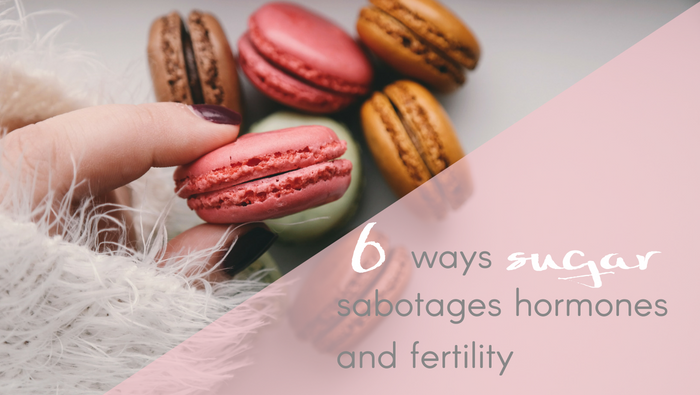Sugar can sabotage hormones and fertility in a lot of ways.
Now, I am a warm, fuzzy, caring person. And I know how women with hormonal health issues AND woman and couples on a tough path to parenthood appreciate empathy and support. I have empathy. Supportive is my middle name.
But I think it’s important to be honest with people. To help teach them and empower them to take control of their own health to balance hormones and cycles and also to max their natural fertility. With no guilt, shame or blame. Because if you don’t know something, you can’t choose how to respond. So sometimes, I’m a bit more direct and lay it on the line. Then it’s up to you to choose what to do armed with that info.
Please don’t feel that your scoffing sweeties or quaffing cupcakes is your fault. Or that you’re somehow contributing to your own issues. PLEASE. That’s NOT what I mean.
Sugar is addictive and I don’t see many programmes teaching us about the dangers of sugar to hormone balance or baby-making either.
Trust me, I’m really here to help. With empathy and support.
Sugar Is Addictive
Yes, sugar is an additive substance. And hurrah! No need to shoot it up, smoke it or snort it.
It makes us feel soooooo gooooodddd. We feel satisfied, soothed, energised…it’s soooooooo pleasurable.
And no unpleasant side effects short term – no staggering, slurring, palpitations, blacking out. We’re more socially acceptable after a cupcake than a draw on a crack pipe.
We use it to celebrate – think cake and chocolates for birthdays. Mince pies and cakes at Christmas. Chocolate Eggs at Easter. And as a reward – sweeties, chocolates, ice cream.
Let’s not underestimate its power though: once a hit wears off, we crave another and another. The dark side of sugar. And it’s not just adults: our children are also hooked.
But this blog is about hormones and fertility, so let’s look at how sugar messes up our delicate hormone balance…
How Sugar Sabotages Hormones and Fertility
#1 The Hormone Rollercoaster
Sugary foods are broken down quickly by our bodies giving us a blood sugar spike, oh and a glorious high. Followed by a crashing low. Insulin (The Fat Storing Hormone) levels peak and trough. I call it riding the rollercoaster of blood sugar, energy, hormones and mood.
The insulin spike and crash stimulates our adrenal glands on top of our kidneys. Our adrenals pump out Cortisol (The Stress Hormone) and Adrenalin to boost blood sugar back up.
So could that be okay after one snarf of a cupcake washed down with a sugary, flavoured coffee? Maybe.
But if that pattern continues. Sugar – insulin spike – insulin crash – adrenals working hard ….well we can burn out our adrenal glands. Leading to hormone imbalances, because the delicate balance of chemical triggers and messages that make up the hormone system are kaput.
Trust me I know. I had adrenal fatigue caused by stress, not by sugar. Although I did crave it to boost my flagging energy at the time. Tired adrenals lead to craving yet more sugar and the risk of eating binges.
Adrenal stress impacts levels of oestrogen, progesterone, testosterone and the hormones. In women and men.
That hormone imbalance can harm ovulation, cycles and fertility.
Eating a hormone friendly and fertility friendly diet avoids this rollercoaster. Some studies show IVF outcomes are higher with a lower carb (not no carb) diet.
#2 Weight Issues
For a long time we were told that fat makes us fat and so everyone went on a low fat diet .
Now we know that it’s sugar that’s more likely to make us fat. With it’s 50 plus different “disguises” on food labels. Added to everything, even savoury foods like baked beans
When we eat carbs and sugary foods, blood sugar rises and insulin spikes, as already mentioned. This drives all our body’s fuel into fat cells, especially around the belly. And this can trigger more hunger, food cravings and overeating.
Weight is a hormonal issue and a fertility issue.
Fat cells – as well as ovaries – produce oestrogen. Overweight and obese women are at risk of too much oestrogen, causing hormones imbalances and conditions like endometriosis and fibroids.
Being overweight is a risk factor for fertility issues too.
#3 Insulin Resistance, PCOS, Obesity and More
The overproduction of insulin we described in #1 can lead to a condition called “insulin resistance”.
And insulin resistance is associated with obesity, Polycystic Ovarian Syndrome (PCOS) and even diabetes. All of those have pretty unpleasant symptoms. All of those can impact fertility. Insulin resistance has been linked with implantation issues and a higher risk of miscarriage as well as ovulation issues.
#4 Low Nutrition
The White Stuff depletes us of nutrients … indirectly. When the body goes into insulin and adrenal overdrive, we use up vital vitamins and minerals. And we need vitamins and minerals for hormone health, fertility and a healthy pregnancy.
#5 Thrush
Okay, so it’s not a hormone imbalance, but eating a lot of sugary foods is a risk factor for yeast overgrowth in the body… candida and thrush.
Thrush is a white, cottage cheesey discharge from the vagina, which is itching and burning. It’s horrible.
Thrush makes the vagina sperm UNfriendly and can make sex uncomfortable.
If you have thrush and have a baby, the baby can catch it when he/she passes through the birth canal. In turn that can cause nappy rash and oral thrush in the baby, making feeding more difficult.
#6 Low Immune System
Busted. Again it’s not strictly hormonal but sugar lowers our immune systems. Leaving us susceptible to all kinds of bugs, lurgies, coughs and colds … plus yeast infections (see #5) and any sexually transmitted diseases too.
So What’s A Sweet Toothed Girl To Do?
Decisions, decisions.
As I see it, the main choices are:-
- Quit sugar. Go “cold turkey”. A good place to start is Sarah Wilson’s website and book I Quit Sugar.
- Reduce it over time by not adding sugar to drinks, avoiding sweet treats, being label savvy and so on. And/or…
- … choose alternative sweeteners. The ones with the least impact on blood sugar are xylitol, stevia and agave. All are processed foods.
- Choose natural sweeteners like fruit, dried fruits, raw honey and maple syrup – they are more nutrient dense, but still impact blood sugar levels. They still contain sugars.
In my view, a hormone and fertility friendly diet is one low in sugar for all the points raised. It’s a piece of fruit a day. Avoiding added sugars. Eating healthy carbs in moderation only.
My experience is that having a sweet tooth is a habit and one which can be broken in time. Women who quit sugar often report that eating a sugary snack some time after they quit tastes revolting and makes them feel sick. Imagine that.
Love,



Recent Comments